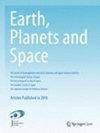Space weather impacts on the ionosphere over the southern African mid-latitude region
IF 2.5
3区 地球科学
引用次数: 0
Abstract
Abstract The ionosphere suffers major perturbations during severe space weather events such as Coronal Mass Ejections (CMEs), solar flares, high-speed streams, and Corotating Interaction Regions (CIRs). The ionosphere can experience depletions or enhancements in Total Electron Content (TEC) during severe space weather conditions. The South African National Space Agency (SANSA) near-real-time (NRT) TEC maps were used to show the ionospheric variability during the geomagnetic storm of 3–8 Nov 2021 over the southern Africa mid-latitude region. The ionosonde TEC, NRT TEC, and the quiet-time AfriTEC model were compared during the 6-day period. A negative ionospheric response was observed during the main and recovery phases of the geomagnetic storm (4–5 Nov 2021). The changes to neutral composition O/N 2 was one of the physical processes attributed to the decrease in TEC over the mid-latitude region. The GPS TEC maps showed a very good agreement with ionosonde measurements and the AfriTEC model. A strong east–west TEC gradient was observed occurring between two ionosonde stations. Graphical Abstract空间天气对南部非洲中纬度地区电离层的影响
在日冕物质抛射(cme)、太阳耀斑、高速流和旋转相互作用区(CIRs)等严重的空间天气事件中,电离层受到较大的扰动。在恶劣的空间天气条件下,电离层会经历总电子含量(TEC)的消耗或增强。利用南非国家航天局(SANSA)的近实时(NRT) TEC地图显示了2021年11月3日至8日非洲南部中纬度地区地磁风暴期间电离层的变化。在6天的时间内比较了离子探空TEC、NRT TEC和安静时间AfriTEC模型。在地磁风暴的主要阶段和恢复阶段(2021年11月4日至5日),观测到电离层负响应。中性组分O/ n2的变化是导致中纬度地区TEC减少的物理过程之一。GPS TEC地图显示与电离层探空仪测量和AfriTEC模型非常吻合。在两个电离层探空站之间观测到强烈的东西向TEC梯度。图形抽象
本文章由计算机程序翻译,如有差异,请以英文原文为准。
求助全文
约1分钟内获得全文
求助全文
来源期刊

Earth, Planets and Space
地学天文-地球科学综合
CiteScore
5.80
自引率
16.70%
发文量
167
期刊介绍:
Earth, Planets and Space (EPS) covers scientific articles in Earth and Planetary Sciences, particularly geomagnetism, aeronomy, space science, seismology, volcanology, geodesy, and planetary science. EPS also welcomes articles in new and interdisciplinary subjects, including instrumentations. Only new and original contents will be accepted for publication.
 求助内容:
求助内容: 应助结果提醒方式:
应助结果提醒方式:


